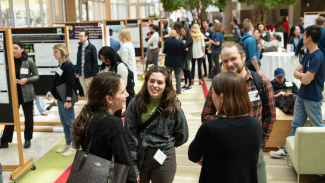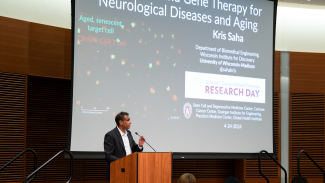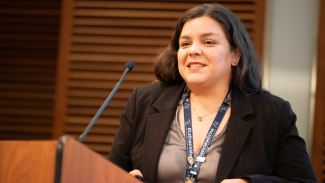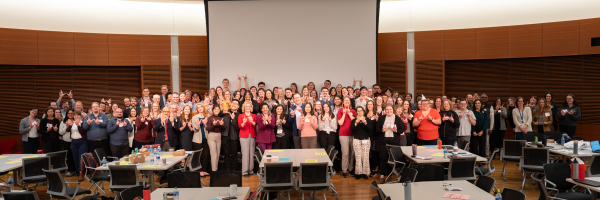
The Wisconsin Alzheimer’s Disease Research Center (ADRC) hosted its annual Alzheimer’s Disease & Related Dementias Research Day on April 24, 2024, at the Discovery Building on the UW–Madison campus. More than 250 people attended the event in person or online. Research Day was started in 2014 to encourage collaboration and promote scientific thought among faculty, students and researchers from a wide range of disciplines across the UW–Madison campus.
The Research Day poster session included 52 presenters. A group of faculty members judged the posters to give out three awards. In-person attendees voted for two additional fan favorite awards during the event. The award winners were:
- Best Fellow, Post Doc, or Research Scientist Poster: Tamara “Tammy” LeCaire, MS, PhD, Wisconsin Alzheimer’s Institute, “Using the RE-AIM Framework to Guide Implementation of an Educational Intervention for Improving the Care of Persons with Behavioral and Psychological Symptoms of Dementia”
- Best Graduate Student or Research Specialist Poster: Abigail H. Evered, BS, Ulland Lab, “Deoxycholic Acid Inhibits NLRP3 Inflammasome Activation in Macrophages and Microglia”
- Best Undergraduate Student Poster: Lauren Gitzlaff, Bendlin Lab, “Relationships Between Brain Microstructure and Braak Stage Progression in Alzheimer’s Disease (AD)”
- Fan Favorite Poster Presentation: Reji Babygirija, MS, Lamming Lab, “Sex-dependent Responses to Calories and Fasting Uncouple Cognition from Neuropathology in a Mouse Model of Alzheimer’s Disease”
- Fan Favorite Lightning Presentation: Rachel C. Otte, BS, MPH, Center for Health Disparities Research, "Public Data Tracing: A Novel Method for Retrospectively Collecting Occupational Data for Brain Bank Research Donors"
Recordings of the featured and lightning presentations can be found on our Research Day 2024 webpage or on our YouTube page.
Presentations

Research Day kicked off with a featured talk from Kris Saha, PhD, an associate professor of biomedical engineering and medical history and bioethics at the University of Wisconsin–Madison. His talk, "CRISPR Cell and Gene Therapy for Neurological Diseases and Aging,” focused on developments for studying and treating neurological diseases like Alzheimer’s disease using genetics.
Rema Raman, PhD, a professor of neurology at the Keck School of Medicine at the University of Southern California, presented "Accelerating the Impact of Next Generation AD/ADRD Clinical Trials through Inclusion and Workforce Development." Her presentation focused on ways the field can support and prepare students and early-career researchers for careers in Alzheimer’s disease clinical trials.
Before her talk, Raman joined the Dementia Matters podcast to share her work with the Institute of Methods and Protocols for Advancement of Clinical Trials in ADRD (IMPACT-AD) and more. Listen to the episode on our website or wherever you get your podcasts.

Maria Mora Pinzon, MD, MS, FACPM, gave the final featured presentation. Mora Pinzon, an assistant professor in the Division of Geriatrics and Gerontology at the University of Wisconsin–Madison School of Medicine and Public Health, presented "What Latinos Think About ADRD - A Population Survey and Implications for Research." Her talk highlighted the importance of tailoring Alzheimer’s disease and related dementias research to communities’ needs and values, particularly focusing on the Latine population.
Ten abstract submissions for the event’s poster session were selected to give oral abstract presentations:
- Lauren W. Yowelunh McLester-Davis, PhD, Gleason Laboratory, "Biological Age Predicts Cognitive Performance for Underrepresented Middle-Aged and Older Participants from the University of Wisconsin Alzheimer's Disease Cohorts"
- Haylee Hamilton, BS, Pehar Lab, Department of Medicine, Geriatrics, "Regulation of Astrocyte-Mediated Neuroinflammation by FABP7 in Aging and Alzheimer’s Disease"
- Andy Madrid, PhD, Alisch Lab, Department of Neurosurgery, "Whole Genome Methylation Sequencing in Blood Identifies Extensive Differential DNA Methylation in Mild Cognitive Impairment (MCI)"
- Julia Illiano, BS, Harris Lab, Department of Biomolecular Chemistry, "Sleeve Gastrectomy Improves Cognition and Frailty in AD Prone Mice"
- Rachael Wilson, PhD, Johnson Lab, Wisconsin ADRC and Wisconsin Registry for Alzheimer's Prevention (WRAP), "Longitudinal Plasma pTau217 Measurements in Preclinical Alzheimer's Disease”
- Aaliyah Mushtaque, undergraduate student, Bendlin Lab, "Gut Microbiota Composition Differentially Abundant in Amyloid-Positive and Amyloid-Negative Individuals May be Associated with Cognitive Function"
- Andrew McVea, MS, Brad Christian Lab, Department of Medical Physics, "Longitudinal Beta-amyloid Measured with [C-11]PiB Accumulates at an Accelerated Rate in Down Syndrome Compared to Neurotypical Populations"
- Ramiro Reyes, PhD, Johnson Lab, Wisconsin Registry for Alzheimer's Prevention (WRAP), "Effect of Refrigeration on Alzheimer's Disease Biomarker Measurements in Plasma"
- Rachel C. Otte, BS, MPH, Center for Health Disparities Research, "Public Data Tracing: A Novel Method for Retrospectively Collecting Occupational Data for Brain Bank Research Donors"
- Natascha Merten, PhD, MS, Merten Lab, "Sensory and Motor Functions Improve Long-Term Predictions of Cognitive Decline and Neurodegeneration"

Updated June 3, 2024.



